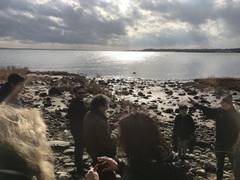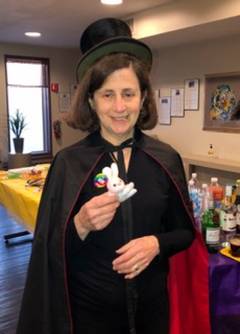P'kudei 5779: Journeys and Destinations
03/14/2019 02:11:18 PM
Mar14
| Author | |
| Date Added | |
| Automatically create summary | |
| Summary |
In my life prior to KTI, I spend many years as a student, first college and then rabbinical school. Part of that lifestyle meant that I was constantly moving. In fact, every nine months or so, or sometimes even more frequently, would I pack up all of my belongings and go somewhere else, including moving to Israel and back twice. There were times in rabbinical school when for various personal and professional reasons I would be away from home almost every weekend for months at a time. This lifestyle continued for almost 10 years, which is part of the reason that I am so happy to be settled here now.
I got a few things out of this peripatetic lifestyle. One, I must admit, is a total disdain for packing suitcases. I need someone to sit with me when I pack to go on vacation because otherwise I simply will not do it. But I got a lot more than that out of my experience. That lifestyle enabled me to have terrific personal and professional experiences that I wouldn't have had any other way. I met interesting people, developed my professional skills, and got to experience living in different neighborhoods, cities and countries. While it felt like I was on a journey, it was also a destination, a desirable outcome unto itself, not just a tedious pause on the way from one thing to another.
Our ancestors were also on a journey about which we read in the Torah. Stumbling out of centuries of slavery in Egypt, they proceeded through the desert, experienced God at Mt. Sinai, and built the tabernacle, about which we conclude reading today with Parashat P'kudei. In this Torah portion, we read of the actual creation and establishment of the Tabernacle and a detailed accounting of the materials used in its construction. Moses finally finishes all of the work and places all the components just so. That alone must have felt like an accomplishment: this massive national project to build something together, to offer lovingly gifts of materials and skills to build a place to encounter God here on earth.
But then, something wondrous happens: “When Moses had finished the work, the cloud covered the Tent of Meeting, and the Presence of the LORD filled the Tabernacle. Moses could not enter the Tent of Meeting, because the cloud had settled upon it and the Presence of the LORD filled the Tabernacle.”
In other words, it worked! All of their efforts came to fruition. The cloudy divine presence took up residence in the Tabernacle, a sign that God would remain with the people in the desert, that what they experienced at Sinai would be sustained beyond that one dramatic moment.
Then, in the final lines of the Book of Exodus, we read, “(When the cloud lifted from the Tabernacle, the Israelites would set out, on their various journeys; but if the cloud did not lift, they would not set out until such time as it did lift. For over the Tabernacle a cloud of the LORD rested by day, and fire would appear in it by night, in the view of all the house of Israel throughout their journeys.”
The cloud, then, functioned as a sort of traffic light, signaling to the people when it was time to move on and when it was time to remain in place.
There is a very subtle detail in these verses as it relates to the word “journey.” That last verse describes how the cloud would rest over the Tabernacle, but that could only be when the people were encamped in a particular spot. In transit, the Tabernacle would be packed away and carried, with the cloud leading the way to the next location. So we cannot read this verse literally; the cloud was not in fact resting on the Tabernacle specifically when the people were in transit.
Rashi, the great medieval commentator, notices this, and offers an elegant and profound solution. Rashi points to two other places in the Torah that talk about journeys. The first is the story of Abraham's return from Egypt, where, according to Rashi there, Abraham stopped in the same places as he did on the way down. The second example, from the end of the Book of Numbers, is the retelling of the journeys of the people Israel in the wilderness, which in fact consists of a list of places where the people encamped.
So, we have two examples where the word journey seems not to refer only to the act of movement, but also to the act of stopping along the way. From this, Rashi notes that, “even a place of encampment can also be called a journey.” This is a nice resolution of our textual problem: the phrase about the cloud resting in the Tabernacle on their journeys refers not only to the times when the people were encamped, but also to everywhere they stopped along the way.
This might seem like a rather pedantic point. We know there are lots of words that have both a narrow and loose meaning. But Rashi's comment here collapses the distinction between a journey and a destination. They exist not as opposites but on a continuum. What seems like a destination can in fact be part of a journey. What seems like stasis can actually be an act of movement. And what seems like home can actually be just a temporary resting place.
As Rabbi Jonathan Sacks put it in his message this week, “So long as we have not yet reached our destination, even a place of rest is still called a journey....To be a Jew is to travel, and to know that here where we are is a mere resting place, not yet a home… Eventually �" after a day, a week, a year, a century, sometimes even a millennium �" we will have to move on. Thus, the portable Tabernacle, even more than the Temple in Jerusalem, became the symbol of Jewish life.”
I've long thought that at the core of being Jewish is a feeling of never being too comfortable, never feeling too at-home. Our supposed destinations are actually just part of one long, unending journey. We've come by this sense honestly: our people's story, from the Bible onward, is one of movement, of exile and return and exile again, of moving around across continents and centuries, by choice or by necessity, never getting too comfortable anywhere.
“Now we are here,” we'll say in a few weeks at our Passover Seders, “but next year, in the Land of Israel,” referring both to the literal land of Israel and also the totally transformed reality that the return from Exile represents in Jewish thinking.
Now we are here. But later, well, who knows? Even at rest, we remain on a journey. Even when we seem as Jews to be at home in our society, we know that that could change very quickly, as our predecessors in medieval Spain, Czarist Russia and Weimar Germany learned the hard way. It's a worrisome existence�"I honestly think it explains why Jews can be so anxious.
This week, the news cycle continued to be domination by questions about antisemitism and the role of Jews in the collective life of our country. There's a lot to be said about this whole situation, very little of it promising. To a student of Jewish history, that these questions have arisen now is not surprising. We are living at a moment of tremendous technological, economic, social and therefore political strain, when old ideas and structures are encountering the forceful and swift winds of change.
It is at precisely these moments that questions about the place of Jews in the world arise. That new Pharaoh who did not know Joseph was the first to warn that the Jews would become a destabilizing element in Egyptian society (Exodus 1:10). Likewise, Haman rose to power and immediately warned that the Jews were a peculiar people who would be loyal to their own laws rather than the kingdom's (Esther 3:8).
And after the French Revolution, one of the first questions the new republic had to address was under what conditions Jews could find their place as citizens in a society governed by the ideals of liberty, equality, and fraternity.
So surely, there are some downsides to our existence of always being on a journey. But certainly there are some positives as well. As Rabbi Sacks put it, “A people that never stops travelling is one that never grows old or stale or complacent. It may live in the here-and-now, but it is always conscious of the distant past and the still-beckoning future.”
Just as my own journeys were the catalyst for growth and development, so are our journeys as a Jewish people: our wandering in the desert, our exiles and returns, our Diasporas and migrations. This movement, these journeys, have kept Judaism alive, fresh, and durable precisely because of its ability to change and grow.
May all of our journeys be worthy destinations.
Fri, October 17 2025
25 Tishrei 5786
Photo Gallery
Photo Albums
Fri, October 17 2025 25 Tishrei 5786
Upcoming Events
All Events
-
Tuesday ,
OctOctober 21 , 2025Women's Rosh Chodesh Group
Tuesday, Oct 21st 12:00p to 1:30p
New Women's Rosh Chodesh Group Tuesdays, 12:00-1:30pm Gather with Cantor Sklar and KTI friends at the start of each month of the Hebrew calendar to learn about the themes and traditions of the coming month. Learn from each other, learn more about each other and better understand the women within our tradition. Enjoy music and lunch together! Please a dairy or parve lunch to enjoy at noon, followed by the discussion at 12:30pm. KTI will provide drinks and dessert. RSVP Appreciated -
Wednesday ,
OctOctober 22 , 2025Rabbi, May I? Modern Responsa
Wednesday, Oct 22nd 10:00a to 11:30a
Wednesdays, 10 - 11:30 AM, KTI Library Ever since Abraham’s famous argument with God, Judaism has been full of debate. Moses and Korah, David and Nathan, Hillel and Shammai, the Vilna Gaon and the Ba’al Shem Tov, Spinoza and the Amsterdam Rabbis . . . the list goes on. No wonder that Judaism cherishes the expression machloket l’shem shamayim, “an argument for the sake of heaven.” Beyond their historical importance, what makes these disputations so compelling is that nearly all of them, regardless of their epochs, are still being argued. The parade of characters spanning three millennia of biblical, rabbinic, and modern disputation reflects the panorama of Jewish history with its monumental political, ethical, and spiritual challenges. This series will examine Jewish responses to exile from the biblical period to our modern day. Considering texts from all genres of Jewish literary creativity, we will explore how the realities and iterpretaions Join as we re-open these timeless debates that lead us to the core of 3,000 years of Jewish conversation. • Justice: Abraham vs. God (October 19) • Holiness and Authority: Moses vs. Korah (November 9) • Inclusion: The Five Daughters vs. the Twelve Tribes (November 30) • Accountability and Morality: David vs. Nathan (December 21) • Resistance: Ben Zakkai vs. the Zealots (January 18) • Law: Hillel vs. Shammai (February 15) • Spirituality: The Vilna Gaon vs. the Baal Shem Tov (March 15) • Boundaries: Spinoza vs. the Amsterdam Rabbis (April 19) • Religious Evolution: Geiger vs. Hirsch vs. Frankel (May 10) • Zionism: Herzl vs. Wise (May 31) -
Wednesday ,
OctOctober 22 , 2025Wrestling with God
Wednesday, Oct 22nd 8:00p to 9:30p
Wrestling with God Wednesdays, 8-9:30 PM Congregants’ homes TBA We need to talk about God. And about how we talk, and don’t talk, about God. It’s a big topic, maybe the biggest. This offering invites adult learners into compassionate inquiry, deepening their relationship to Jewish text through collective exploration. Using the album s*ngs ab-ut g?d [https://open.spotify.com/album/6JEY2AN6awAxNfWwmXX460] by Jewish educator Eliana Light as a starting point, this series blends music, Hebrew text study, and open-ended questions to help participants examine their own connections to the divine. This is sacred work. It’s not about getting it right. It’s about showing up with curiosity, humility, and a willingness to join the long lineage of Jews who wrestle with God. Each session stands alone, but we’d love to have a consistent group as much as possible. Dates: September 10: skyman October 22: shadows November 19: in the silence December 10: if only January 21: lead me back February 11: three steps March 11: beyONEd April 29: the mountains May 20: the name June 17: I rise -
Thursday ,
OctOctober 30 , 2025Coffee with the Rabbi
Thursday, Oct 30th 8:00a to 9:00a
Start your morning with some caffeine and casual or meaningful conversation! Join Rabbi Goldberg for a Coffee Chat! Stop by Rye Ridge Starbucks any of the following Thursdays, between 8-9am: June 12 and 26 July 10 and 24 August 7 and 21 September 4 and 18 October 16 and 30 November 6 and 20 December 4 and 18 -
Saturday ,
NovNovember 1 , 2025Dror Israel Shabbat
Shabbat, Nov 1st 11:30a
Dror Israel Shabbat Dror Israel’s Mirit Sulema, along with two leaders of the Arab Youth Movement NOAL, Tal Tunik and Shadi Habiballa, will speak during a Kiddush lunch about their important work with Arab Israeli youth and bringing Jewish, Arab, and Druze youth together. Saturday, November 1st, approx. 11:30am KTI Social Hall "We eat together, laugh together. We talk about what we think of each other, and what will help bring peace.” RSVP Appreciated
Privacy Settings | Privacy Policy | Member Terms
©2025 All rights reserved. Find out more about ShulCloud






